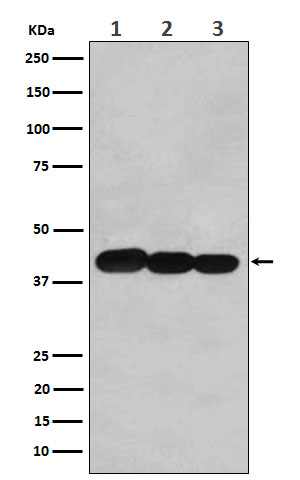
| WB | 咨询技术 | Human,Mouse,Rat |
| IF | 1/20-1/50 | Human,Mouse,Rat |
| IHC | IHC:1/100-1/200;IHF:1/50-1/200 | Human,Mouse,Rat |
| ICC | 1/50-1/200 | Human,Mouse,Rat |
| FCM | 1/20-1/100 | Human,Mouse,Rat |
| Elisa | 咨询技术 | Human,Mouse,Rat |
| Aliases | Apoptosis facilitator Bcl 2 like protein 14; Apoptosis regulator BCL G; Bcl2 L 14; BCL2 like 14; BCL2L14; BCLG; testicular tissue protein Li 26;;Bcl 2 L14 |
| WB Predicted band size | Calculated MW: 37 kDa ; Observed MW: 40 kDa |
| Host/Isotype | Rabbit IgG |
| Antibody Type | Primary antibody |
| Storage | Store at 4°C short term. Aliquot and store at -20°C long term. Avoid freeze/thaw cycles. |
| Species Reactivity | Human,Mouse,Rat |
| Immunogen | A synthesized peptide derived from human Bcl 2 L14 |
| Formulation | Purified antibody in PBS with 0.05% sodium azide,0.05% BSA and 50% glycerol. |
+ +
以下是关于BCL-2家族蛋白抗体的示例参考文献(注:文献为示例性质,建议通过学术数据库核实具体研究):
1. **文献名称**:Targeting BCL-2 with Venetoclax in Chronic Lymphocytic Leukemia
**作者**:Souers AJ, et al.
**摘要**:研究报道了BCL-2抑制剂Venetoclax的开发及其在慢性淋巴细胞白血病(CLL)中的临床效果,通过选择性结合BCL-2蛋白诱导癌细胞凋亡。
2. **文献名称**:BCL-XL Antibody Sensitizes Solid Tumors to Chemotherapy
**作者**:Tse C, et al.
**摘要**:探讨了针对BCL-XL蛋白的单克隆抗体在增强实体瘤对化疗敏感性的作用,通过阻断BCL-XL的抗凋亡功能促进肿瘤细胞死亡。
3. **文献名称**:BCL6 as a Diagnostic Marker in Diffuse Large B-Cell Lymphoma
**作者**:Dalla-Favera R, et al.
**摘要**:分析了BCL6抗体在弥漫大B细胞淋巴瘤(DLBCL)中的诊断价值,强调其表达水平与疾病亚型分类及预后的相关性。
4. **文献名称**:Dual Inhibition of BCL-2 and MCL-1 Enhances Apoptosis in AML
**作者**:Konopleva M, et al.
**摘要**:研究了联合使用BCL-2和MCL-1抗体在急性髓系白血病(AML)中的协同效应,证明其可克服单药耐药性问题。
建议通过PubMed或Google Scholar检索实际文献,使用关键词如“BCL-2 antibody”“BCL6 inhibitor”或“BCL-XL targeting”获取最新研究。
The BCLG antibody targets the B-cell lymphoma germline (BCLG) protein, a molecule implicated in B-cell development and lymphomagenesis. Initially identified through genomic studies of B-cell malignancies, BCLG is encoded by a gene locus frequently altered in non-Hodgkin lymphomas, particularly diffuse large B-cell lymphoma (DLBCL) and follicular lymphoma. Structurally, BCLG belongs to a family of regulatory proteins that modulate apoptosis and cell cycle progression, often interacting with anti-apoptotic BCL-2 family members. Dysregulation of BCLG, due to chromosomal translocations or mutations, disrupts normal B-cell differentiation, promoting uncontrolled proliferation and resistance to cell death—hallmarks of lymphoid cancers.
BCLG antibodies have emerged as critical tools in both research and diagnostics. They enable detection of BCLG expression in tumor tissues, aiding subtype classification and prognostic assessment. In research, these antibodies help elucidate BCLG's role in oncogenic signaling pathways, including its interplay with transcription factors like MYC. Therapeutically, efforts to develop anti-BCLG monoclonal antibodies or antibody-drug conjugates are ongoing, aiming to selectively target malignant B-cells while sparing healthy tissues. Challenges include optimizing specificity due to structural similarities with other BCL family proteins. Despite this, BCLG remains a promising biomarker and therapeutic target, reflecting its central role in B-cell biology and pathology.
×